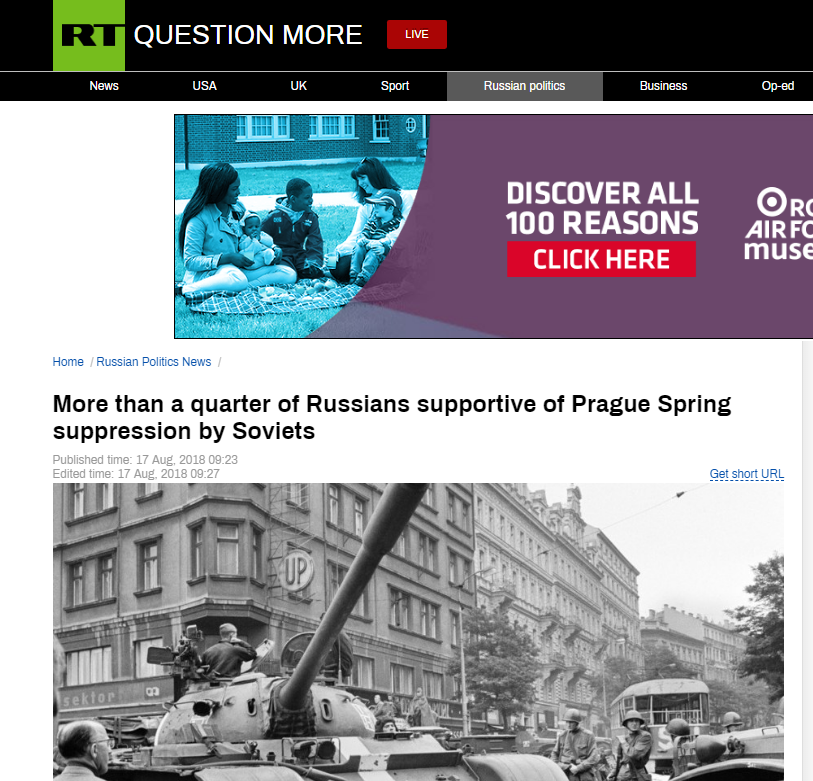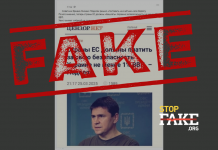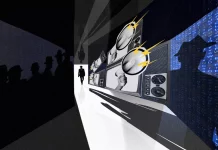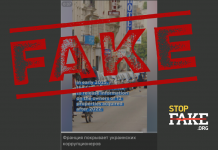By Sarah Hurst (@XSovietNews). for StopFake
The Kremlin not only writes its own version of current events such as the downing of MH17 and Bashar al-Assad’s chemical weapons attacks in Syria, but also strives actively to promote a very different – and extremely distorted – version of history. Most disturbingly, Stalin has been rehabilitated as a great war leader, while his reign of tyranny is downplayed. Another one of the foundation stones propping up Vladimir Putin’s aging regime is the insistence that Russia and Ukraine are one country.
Claims on Ukraine
On Ukraine’s Independence Day, August 24, Petro Poroshenko watched as the country’s defence minister gave the new official military greeting to troops, “Glory to Ukraine!”, which enrages the Kremlin, and the president then said in his speech that Ukraine needed to break off permanently with the Russian empire and the Russian Orthodox Church, which backs Russian aggression against Ukraine.
The speech was denounced by Russian media, including, for example, the business newspaper Vzglyad, which ran an opinion piece by Petr Akopov explaining why Ukraine’s efforts to join Europe are doomed to failure. “Ukraine is part of Russia, inalienable and inseparable, essential and historical – without Ukraine there is no Russia either as an empire, or as Russia at all,” Akopov wrote. When the Soviet Union broke up almost 30 years ago the countries of Russia, Ukraine and Belarus were created, he went on, but “Russians put so much effort into bringing their lands together, opposing their enemies, building their state, that appealing to three decades of separation is simply funny. This is an instant in the thousand-year Russian history, and we’ll see it disappear into eternity,” he predicted. “Ukraine as part of Europe isn’t only unnatural, but impossible,” Akopov claimed.
Pro-Kremlin think-tanker Nikita Isayev had a more realistic view of the Independence Day events, pointing out on a Russian TV talk show that Ukraine has many allies whose troops participated in the parade, while Putin could only muster the unpopular president of Moldova, Igor Dodon, as a guest on Victory Day. When Isayev commented that next year’s presidential election in Ukraine would be interesting, the talk show host immediately interrupted to add that it would be held “under the barrel of NATO guns”. If Russians start to see that Ukrainians themselves want freedom and are proud of it, their fragile belief that Putin is battling a Western conspiracy could be undermined.
Czechoslovakia protest
One day after Ukraine’s independence celebration, several activists gathered in Red Square for the 50th anniversary of the famous Soviet protest against the invasion of Czechoslovakia, in which eight dissidents held a banner that said “For our freedom and yours.” Pavel Litvinov, who participated 50 years ago and was sentenced to exile, returned to the same spot and demanded the release of Oleg Sentsov and the return of Crimea to Ukraine. Three of the demonstrators were detained – two of them again holding a banner with the original slogan on it.
While people all over the world commemorated the 50th anniversary of the invasion of Czechoslovakia, which put an end to democracy there for another 20 years, RT’s Bryan MacDonald tweeted: “It’s interesting how the Soviet invasion of Czechoslovakia is being recast as a ‘Russian invasion’ these days. The troops were ordered in by two Ukrainians (Brezhnev and Podgorny) and under the authority of another Ukrainian (Grechko) and commanded by a Belarusian (Yakubovsky).”
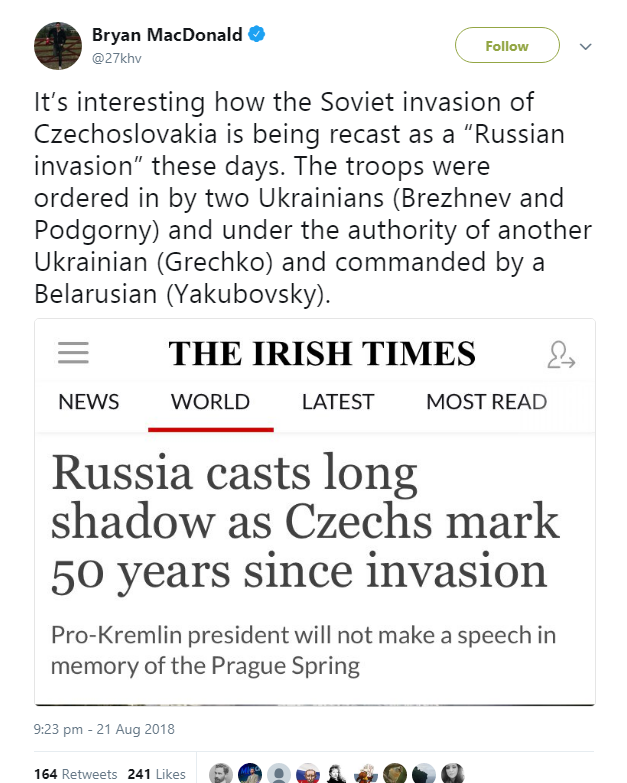
Meanwhile the Russian embassy in the Netherlands was upset by a tweet from analyst Jakub Janda, who captioned a photograph, “Young Russian occupant is confronted by Czechoslovak citizen.” The embassy responded, “Russian occupant? Russian? We got used to the ‘fighters’ against [Russian flag] ‘propaganda’ spreading fake news. But calling USSR – Russia and omitting the fact of involvement of other Warsaw Treaty Organization countries reveals the real level of some ‘experts’.”
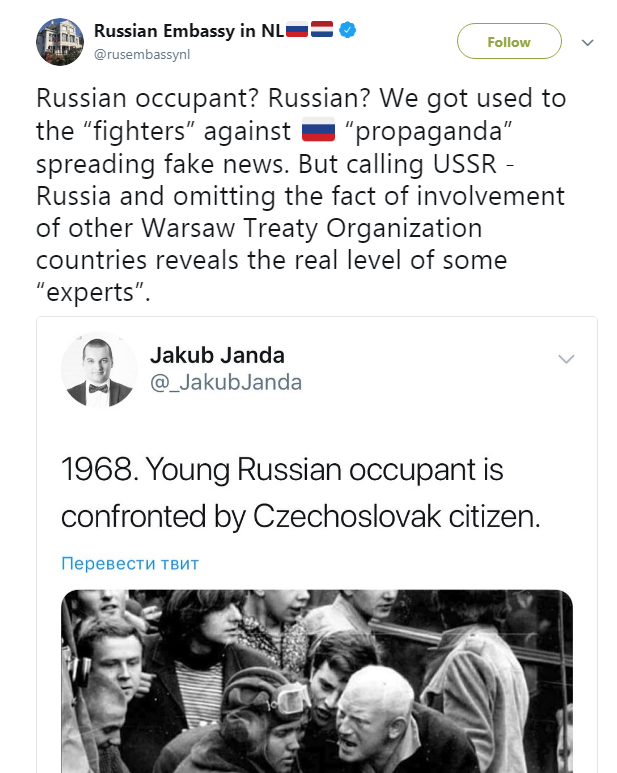
Rehabilitating Stalin
The reality is that Moscow was the capital of the Soviet empire and all decisions were made in Moscow. All independence movements within the Soviet Union or Warsaw Pact countries were put down by force, and that has continued in the Putin era. And today it is only Russia that is still making excuses for these events. On August 17 RT published an article titled “More than a quarter of Russians supportive of Prague Spring suppression by Soviets.”
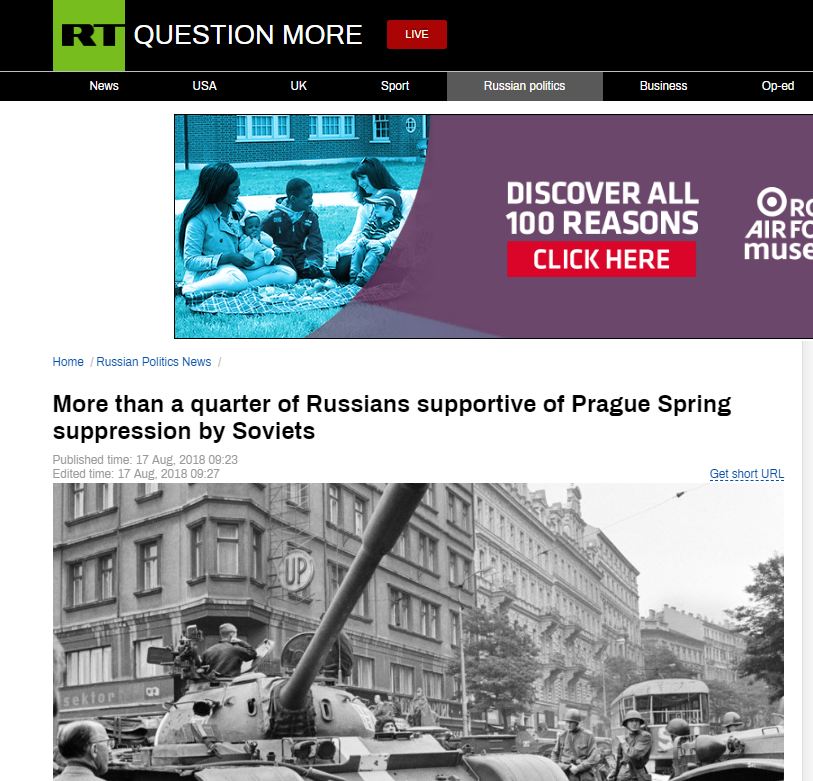
The article linked to one from July 2017 quoting a poll that found that most Russians support the idea of Stalin monuments.
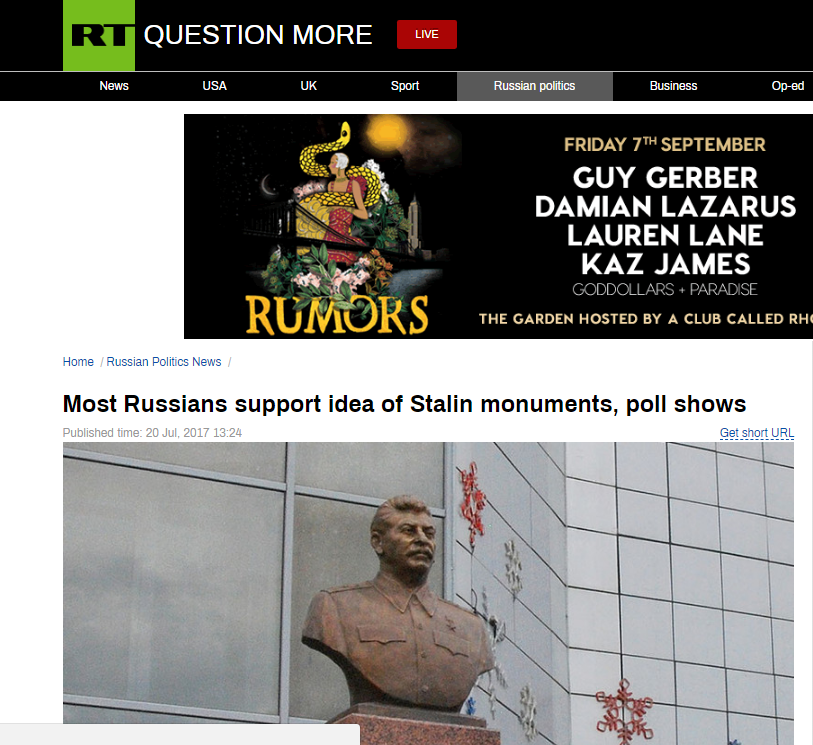
According to RT, “When researchers asked Russians if they consider it reasonable to install memorials that would remind future generations of Stalin’s wrongdoing and errors, 65 percent said no and only 28 percent voiced their support for the idea.”
In January this year Russian authorities banned Armando Iannucci’s film “The Death of Stalin”. A Moscow cinema that briefly defied the ban was fined. Although the tone of the film is satirical, the real events it depicts are very serious: members of the Politburo panic when they find Stalin incapacitated in a pool of his own urine, and a power struggle ensues that results in the execution of the mass murderer and rapist Beria, and ultimately Khrushchev’s ascension to the leadership of the Soviet Union. The film has evidently been banned not for giving the wrong impression of history, but for the right one.
62-year-old historian Yuri Dmitriev, who is also head of the Karelia branch of the Memorial human rights group, has spent decades researching the thousands of Stalin’s victims who were executed in the Sandarmokh forest. The FSB fabricated a criminal case against him, accusing him of making pornographic images of his adopted daughter. Even Russian experts agreed that this was in fact a health journal of photographs of her that he kept in order to prove that she wasn’t being abused after leaving a children’s home. He was subjected to forced psychiatric treatment, and found to be of sound mind. Dmitriev was acquitted in April last year, very unusually, but authorities were not satisfied with this outcome and have now thrown him into prison ahead of a new trial on new invented charges. Dmitriev has received support from campaigners within Russia and around the world.
Baltic occupation denied
Instead of acknowledging Soviet crimes, Putin compounds them by punishing those who remember them and who compare today’s repressions with those of the past. On August 23 Russia’s Foreign Ministry tweeted a comment by their spokeswoman Maria Zakharova: “Our official position remains unchanged. We reject the allegations of the Baltic states’ ‘occupation’ by the USSR as well as the absurd and totally ungrounded legal and historic arguments that make up the essence of the claims on Russia.”
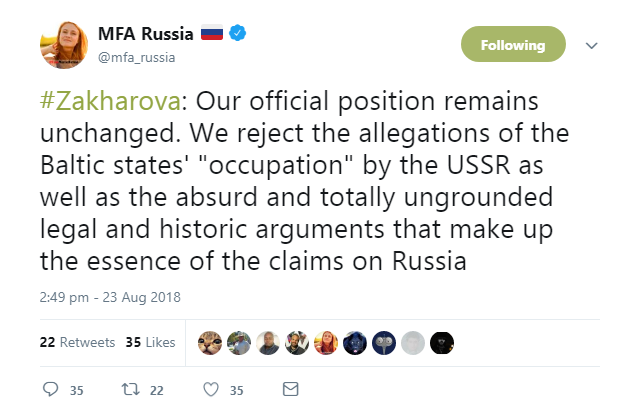
Former Estonian President Toomas Hendrik Ilves responded, “HaHaHa. We really wanted to join that murderous miasma voluntarily.” As members of the European Union and NATO, the Baltic states are now the most successful democracies of the former Soviet republics and have not been invaded by Russia like Moldova, Georgia and Ukraine.
The Soviet Union annexed the Baltics during the period of the Nazi-Soviet Pact, and also invaded Finland. Unsurprisingly this is one of the most sensitive aspects of history for Putin. Instead of expressing any regret for wrongdoing, the Kremlin resorts to its usual tactic of claiming that other countries were just as bad. On August 26 the Russian embassy in Canada tweeted sarcastically, “Following numerous requests of online experts on Soviet-German relations in 1930s here’s the list of non-aggression pacts concluded with #Germany while Hitler was in power. Nota bene #Poland/Baltic states did the same before #USSR. Small hint – the Soviet one is at the very bottom.” The list includes Germany’s pacts with Japan, Hungary, Italy and Spain – its wartime allies.
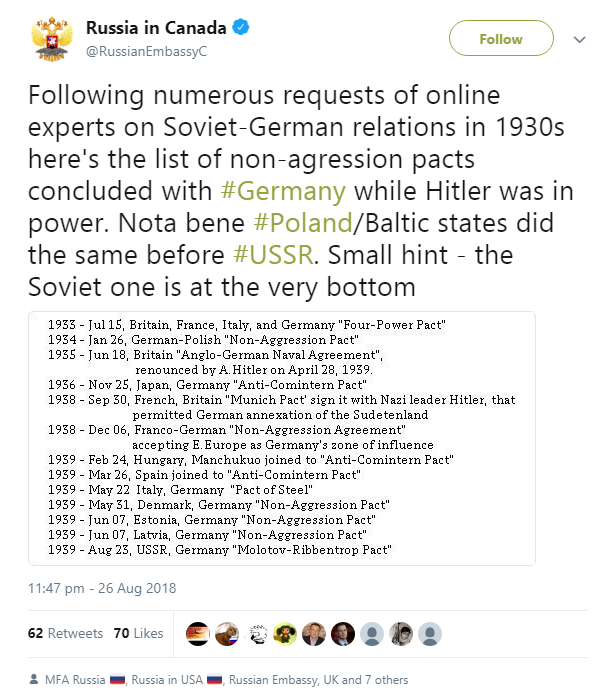
Poet prosecuted
Russian poet Alexander Byvshev was informed a few days ago that his book of poems about World War II, “Bloody Memory”, will be included as evidence in the sixth criminal case against him for “extremism”. Byvshev has already been convicted twice for his poems in support of Ukraine, and has been banned from teaching or having a bank account. He lives with his elderly parents in the small town of Kromy in Oryol Oblast. Byvshev thinks that a charge of “rehabilitating Nazism” could be added to the charge of extremism, since many of his World War II poems accuse Stalin and the Soviet leadership of war crimes. This is one of the poems in the book:
WE CAN!
Father of the peoples sits on show
In that jacket we know so well.
Attack head on, full flow!
Our defence can go to hell.
Days left until the celebration.
Forward! And don’t lose an hour!
The little soldiers of the nation –
Are fodder for the cannon’s power.
Such casualties, what to say!
(Fritz isn’t even a fan…)
How can you toss people away?!
But the leader waves, “We can!”
(February 12, 2014)
When “Bloody Memory” was first published, it was praised by the Communist Party. Even during Byvshev’s trials for his Ukraine poems, schoolchildren in Russia have recited his World War II poems at competitions. But the Kremlin is becoming more and more reactionary, and trials more absurd. Byvshev continues to defy Putin, publishing his poems on Facebook. One of the latest ones, titled “To War Criminal Georgy Zhukov” says that Zhukov deserved to be hanged for sending 45,000 Soviet troops to march through the epicentre of a nuclear test in 1954. The Kremlin certainly doesn’t need fearless people like Yuri Dmitriev or Alexander Byvshev writing about such episodes.
Philosopher George Santayana wrote, “Those who cannot remember the past are condemned to repeat it.” No country proves this more conclusively than Russia. Until Russians reclaim their bloody memories, they will have to wonder why things are going so badly wrong.


